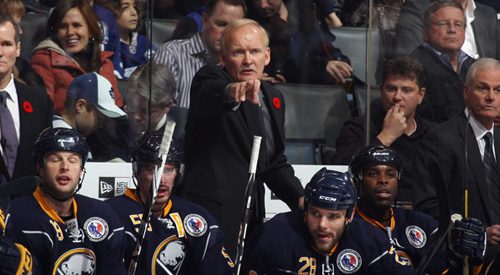
A brief history of Lindy Ruff, the modern model for coaching longevity
When it comes to job security, being a head coach in the NHL is one of the worst professions one could hope for – but don’t tell that to Lindy Ruff.
As a bench boss in the early stages of his 13th season with the Buffalo Sabres, it was his time before taking the reins as coach that paved the way for him and what he has been battling ever since. Drafted as a player in the second round, 32nd overall by the Sabres in 1979, Ruff played 12 years in the NHL, displaying many of the traits that currently make him a successful head coach.
After a broken thighbone hurt his draft position, Ruff made the big club out of training camp. He was a defenseman but also played left wing for numerous seasons, providing him with a deep knowledge of both the offensive and defensive side of the game and a first-hand look at all the angles and nuances of each position.
The hard-nosed kid from western Canada showed he was a perfect fit for Buffalo, New York. He prided himself on his blue collar attitude, working for everything he was ever given. (Case in point: Although his 300 career points are impressive, so too are his 1,264 penalty minutes.)
Most importantly, for three seasons Ruff was the captain of the Sabres. It inevitably foreshadowed the now-51-year-old’s leadership role within the organization today.
After a quick stint towards the twilight of his playing days with the New York Rangers starting in 1988, and being named a player-coach in the International Hockey League a few years later, Ruff was called on by the legendary Roger Nielson to guide the defense corps and penalty killing units of the expansion Florida Panthers. Three years later, the Panthers were the Cinderella story of hockey, riding a wave of sacrifice, heart and teamwork to a Stanley Cup Final appearance.
[php snippet=1]
Coming full circle, the much-loved Ruff was named head coach of the Buffalo Sabres in 1997.
Even though he was a fan favorite right from the start, the former Rochester American player didn’t exactly come into the best of situations. Ruff inherited a team who had just won its first division title in 16 years yet fired head coach (Ted Nolan) and general manager (John Muckler) who were coming off Jack Adams and Executive of the Year awards, respectively. To make matters worse, the team was sold to new owners in December of his first season behind the bench.
Nevertheless, Ruff persevered. He tempered the off-ice drama that plagued his predecessor and took the team to the Conference Finals in his first season as head honcho, then the Stanley Cup Finals the year following. That series, of course, featured what is most likely the most controversial goal of all-time. Eventually, Ruff watched that team slowly lose its key contributors as captain Michael Peca held out for an entire year and perhaps the best goalie of this generation, Dominik Hasek, couldn’t come to terms on a contract and was traded.
Fast forward to 2002 and another ownership change took place, triggering full rebuild mode. The Sabres traded their captain, Stu Barnes and prominent veterans Rob Ray along with Chris Gratton. Through a flurry of change and turmoil, Ruff remained the club’s leader.
When the new rules were installed after the 2004-05 lockout, the Sabres’ roster members became the poster boys of the “new NHL,” displaying skill, speed and creativity all over the ice. Buffalo had its first 50-plus-win season with 53 victories, including a franchise record 25 road wins. They met the Carolina Hurricanes in the Eastern Conference Finals but fell in seven games to the eventual champions. On a personal note, however, Ruff captured coach of the year honors in 2005-06, his one and only.
The following year, Buffalo set even more records. The Sabres became the second team in NHL history to start the season with a 10-game winning streak while also marking up the NHL record books with eight road wins to begin the campaign. They went on to nab their first ever President’s Trophy and tied their franchise record for points in a season with 113. They would go on to lose in the Conference Finals yet again — this time to the Ottawa Senators — as Ruff watched the same organization, yet different team, once again lose their best players (Danny Briere et al.).
Over the past three years, the Sabres have been bringing in young players and slowly rebuilding their team, with players like Tyler Myers and Tyler Ennis. They’ve been first-round playoff casualties in that time, but toward the end of last year, something changed. Buffalo went through yet another ownership change, this time bringing in win-obssessed Terry Pegula.
After receiving an extension at the end of the 2010-11 season, Ruff finally saw his team go out and spend some money in the offseason. They brought in a respectable haul of big ticket players in Robyn Regehr, Christian Erhoff and Ville Leino.
If nothing else, it has become obvious over his tenured career as a player and now coach that Ruff has shown he has the ability to get the most out of the available talent and string together deep playoff runs. With his organization now opening the wallet, maybe — just maybe — it’s time he reap what he has sown.
[php snippet=1]

